MOSUL, Iraq — The soldiers from the Iraqi army’s 2nd Division gawked at it, posed for pictures with it, rubbed their hands on it and then stood in crisp form when U.S. troops introduced them last week to their newest weapon. 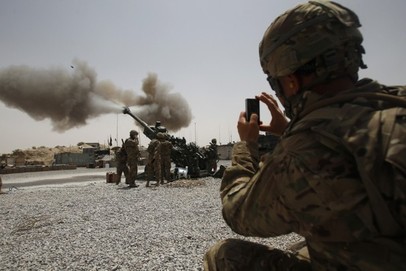 In a two-story warehouse on the grounds of an old Iraqi ammunition storage site stood a confidence-builder for the beleaguered Iraqi army: an M198 howitzer cannon. For Iraqi soldiers yearning for people’s respect, the arrival of American-made artillery was a big step toward building the pride that is essential to any effective army.
“This is so much technology, powerful,” said Ali Hadi, 42, a specialist in his division’s new artillery regiment. “Things are going to get better.’’
The new 155mm guns are part of a multibillion-dollar effort to upgrade the Iraqi army ahead of the scheduled withdrawal of the remaining U.S. forces by Dec. 31. Among growing shipments of American-made weapons to Iraq are M1A1 Abrams tanks, M113 armored personnel carriers and patrol boats.
In a country where eager soldiers still believe a bigger weapon makes a bigger man, the wiping out of its artillery capability in the U.S.-led 2003 invasion has never sat well with Iraqi commanders. Until now, said Col. Alaa A. Abdalrida, of the 2nd Division, “without the Americans, I couldn’t defend the country.”
The new artillery, Abdalrida said, “will ensure the Iraqi army is no less than other armies.”
Under Saddam Hussein, Iraq’s artillery capabilities were among the best in the Middle East, forming the backbone of its army’s battle plan in the war with Iran in the 1980s. In the run-up to the 1991 Persian Gulf War and the 2003 invasion, U.S. military planners feared that Hussein would arm his artillery with chemical or biological warheads, concerns that later proved unfounded.
Ultimately, Hussein’s artillery was no match for U.S. warplanes, tanks and artillery, and much of Iraq’s heavy ordnance was destroyed in the 2003 invasion. What remained was decommissioned, fell into disrepair or lacked ammunition for use by the new Iraqi army, according to U.S. and Iraqi military officials.
The post-Hussein Iraqi army has instead relied on short- and medium-range mortars. Because Iraq still lacks warplane and missile capabilities, experts have voiced doubts that it could repel an invasion without U.S. help.
The first howitzers arrived this spring, and soldiers from the U.S. Army’s 25th Infantry Division have finished training Iraqi soldiers in Diyala, east of Baghdad, on how to operate the cannons. The field artillery unit of the U.S. Army’s 1st Cavalry Division, based in Fort Hood, Tex., began the training here in northern Iraq on Monday, at the Ghuzali Eagle Training Center.
“They will now basically have what we have,” said Lt. Rory R. Garcia of the 1st Cavalry Division field artillery unit, which is training Hadi’s regiment in how to operate and maintain the weapons.
American military officials said the U.S. government withheld some features of the howitzers considered classified. But they said the 42-foot-long, computer-guided weapons will cover up to 13 miles, more than triple the range of Iraq’s largest mortar.
The weapon has a “kill zone” of 100 feet, and injury-causing shrapnel will probably fly out to 500 feet, said Sgt. Bobby Brewster of the 1st Cavalry Division’s artillery unit.
On the first and second day of training last week, the 40 Iraqi soldiers were divided into groups to learn how to target and fire the weapons. Like any good lesson plan, the basics came first.
“If one or both tires are missing, you cannot operate this system,” a U.S. soldier, speaking through an interpreter, told the Iraqi soldiers gathered around him.
One important lesson for the Iraqi army, according to Garcia and Brewster, is that a well-trained soldier using a M198 howitzer will be far more effective than Hussein’s army was in its use of artillery.
Although Hussein amassed as many as 3,000 artillery pieces, many from Russia, U.S. military officials say soldiers in the old Iraqi army lacked the training and technical support needed to use the weapons effectively.
“We would see a round go off far away, then they would readjust, and it would go off even farther away. We would counter-fire once and then hear no more,” recalled Brewster, who took part in artillery battles during the 2003 invasion.
The goal, Brewster and Garcia said, is to train Iraq’s new army artillery units to deliver the same precision.
ISLAMABAD: Pakistan’s civilian leaders should capitalise on public anger with the military and try to ease its grip on power, a leading human rights activist and lawyer said on Tuesday. 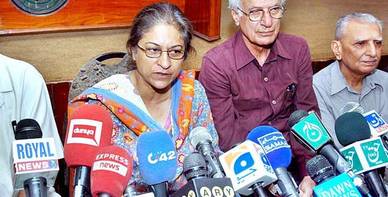 The army’s image has been dented by a number of setbacks starting with the killing of Osama bin Laden last month by US special forces on Pakistani soil. Traditionally seen as untouchable, Pakistan’s generals now face strong public criticism.
Asma Jahangir, a leading human rights campaigner and head of the Supreme Court Bar Association, said the mood in the country provided an opportunity to start correcting a lopsided balance of power between the army and the civilian government.
“I am hopeful that public opinion will finally embolden civil society, including politicians. But it’s not going to happen tomorrow morning,” she told Reuters in a telephone interview.
“It’s going to be a perpetual struggle. They are not just going to hand over and say ‘thank you very much we are now under civilian control’. But at least they know that’s what people want now.”
The military has ruled nuclear-armed Pakistan for more than half of its history. Generals set security and foreign policy, even when civilian governments are in power, as is the case now.
The 600,000-strong army also runs a vast business empire that includes oil and gas interests, cereals and real estate.
“Our parliament has to strengthen itself for anyone to change because nobody hands over power just voluntarily,” said Jahangir.
“The parliament will have to be more forceful and also begin to realise that they (the army) can’t hold the economy of this country hostage, foreign policy hostage.”
Pakistan’s civilian leaders don’t seem willing to stand up to the military in a country prone to army coups. Generals often orchestrate Pakistani politics from behind the scenes.
“They have selfishly overlooked the interests of the people of Pakistan. We think that it’s time to change,” said Jahangir.
The army says it does not interfere in politics and reiterated its commitment to democracy in a statement issued this month.
Jahangir said she is hopeful of change because the military has been on the defensive. The United States kept Pakistan in the dark over the raid that killed bin Laden, humiliating the army and then piling pressure on it to crack down harder on militancy.
About 25 percent of government expenditure flows to the defence budget, according to some estimates, in a country with widespread poverty and social inequalities.
“The government needs to make legislation on intelligence agencies. They need to debate the defence budget. They don’t need to cut it but at least they need to debate it,” said Jahangir.
“There are parliamentary committees that are oversight structures for them. And there needs to be more parliamentary committees which are more effective.”
To make matters worse for the military, suspicion fell on its Inter-Services Intelligence (ISI) spy agency after a prominent Pakistani journalist was tortured to death and dumped in a canal. The ISI said it played no role in his death.
Then the killing of an apparently unarmed man by paramilitary forces which was caught on videotape further eroded what little public confidence remains in Pakistan’s security forces.
Jahangir said politicians and Pakistanis should move swiftly, but cautiously, to try and strengthen civilian institutions while the military seems vulnerable.
“Momentarily they are a bit worried. They are vulnerable to the extent that people are besieging them to change. It is critical,” she said.
“They have a way of overcoming it too. They know that this is momentary. They will soon start getting their civilian counterparts to change public opinion to confuse the issue, to demonise people. We have seen it happen before.”
ISLAMABAD: Pakistan’s military chief is working to repair his army’s wounded pride in the bitter aftermath of the raid that killed Osama bin Laden, a humiliation that has strained US-Pakistani relations and raised questions about the top general’s own standing. 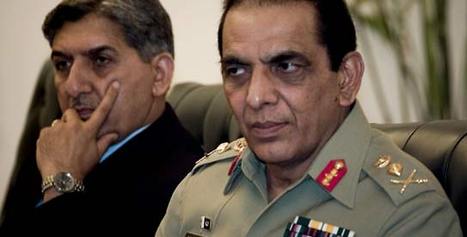 Retired and serving officers interviewed by The Associated Press spoke of seething anger within army ranks over the secret strike the Americans carried out on May 2, undetected by Pakistan’s military.
The US helicopter-borne operation set off a nationalist backlash: The usually untouchable army was sharply criticized in the press and on television talk shows, people demonstrated here in the capital demanding accountability, and open calls were made for the resignation of Gen. Asfaq Parvez Kayani, the military chief.
The army is Pakistan’s strongest institution, and Kayani the nation’s most powerful leader, but he ”has to be very careful,” said retired Lt. Gen. Talat Masood.
Like others interviewed, he doubted Kayani’s underlings would try to unseat him in an intra-army coup, but he noted occasions in the past when disgruntled officers were found to be plotting against their chief.
These rumblings generally occurred after the army suffered an embarrassing defeat, most notably Pakistan’s 1971 loss of East Pakistan, now Bangladesh, when India took 90,000 Pakistani prisoners of war who weren’t released for a year.
Last month’s raid on the al-Qaida leader’s Abbottabad compound resurrected public comparisons to that Bangladesh debacle.
In one sign of dented military prestige, Pakistan’s Supreme Court ordered the withdrawal of a two-star general after his men were caught on video killing an unarmed youth. The court took the unusual action ”in light of the hostile environment in the society toward the military,” said defense analyst Hasan Askar Rizvi.
The public disquiet weighs heavily on the officer corps and down through lower ranks, Masood said.
”It could all result in loose talk,” he said, but he thought it wouldn’t go beyond that. He noted that within days of the bin Laden raid, Kayani met with key corps commanders in an effort to assure his ranking officers they had not been humiliated.
There’s ”quite a lot of anger” within the military, retired Gen. Jehangir Karamat, a former chief of staff himself, said in a telephone interview from the eastern city of Lahore.
”Maybe there is talk,” he told the AP. ”Maybe anti-US feeling has gone up in the army. But actually there is in the country a whole lot of anger over the way it happened and the humiliation suffered, and it is inevitably reflected in the army.”
But, he added, ”all this talk of him fighting for his job, his survival, I don’t see any signs of that.”
Kayani is consistently described as a ”professional soldier” by his own men and knowledgable foreigners. But the general, who as a younger officer did some training in the US, may face criticism because of the Pakistani army’s close past cooperation with the US military and dependence on US aid.
At the same time, the Pakistanis have come under sharp criticism in Washington for having apparently missed bin Laden’s presence in Abbottabad.
Knowledgable observers here said the fracture with Washington could set back military-to-military relations between the two countries by years, as the Americans seek to step up the joint fight against al-Qaida and other militant groups in the Afghan border area.
”There is a very strong resentment, a very strong sense of betrayal of being discredited in the eyes of our own public. What our enemies have not been able to do they (the US) have done to us,” said a senior military official, who asked that his name not be used to speak candidly.
Pakistan has already sent home nearly 100 US military personnel, most of whom were training the Frontier Corps, the tribal force that patrols Pakistan’s long and porous border with Afghanistan.
Pakistan is holding up visas for CIA officials waiting to come here, and Pakistan’s intelligence agency has arrested alleged CIA informants said to have helped lead the Americans to bin Laden.
In Washington last week, Adm. Mike Mullen, the Joint Chiefs of State chairman who has been to Pakistan to try to patch up differences, said letting the relationship with this nuclear-armed nation deteriorate isn’t an option.
If the relationship crumbles or ”were we to walk away, I think it’s a matter of time before the region is that much more dangerous and there would be a huge pull for us to have to return to protect our national interests,” Mullen added.
NEW DELHI: Days before peace talks, India and Pakistan were caught in an angry exchange of accusations Sunday over the movements of their warships engaged in operations against Somali pirates in the Indian Ocean. 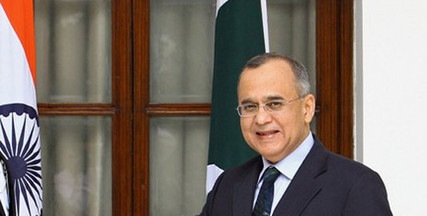 An Indian naval ship and a Pakistani naval vessel brushed against each other Thursday.
Pakistan protested Friday, saying the Indian warship undertook dangerous maneuvers, and a day later India said it was the Pakistani ship that had jeopardized safety.
The spat comes less than a week before Indian and Pakistani officials are to meet in Islamabad for peace talks on a range of issues, including their long-standing dispute over the Kashmir region and the threats posed by terrorism.
The talks between Indian Foreign Secretary Nirupama Rao and her Pakistani counterpart, Salman Bashir, would mark the first formal talks between the South Asian rivals on Kashmir since India broke off peace negotiations in 2008 after terrorist attacks in Mumbai killed 166 people.
The two days of discussions starting June 23 are in preparation for peace talks at the level of foreign ministers scheduled for next month.
Thursday’s incident occurred while the Pakistani ship was escorting a merchant vessel, MV Suez, that had been threatened by Somali pirates. The MV Suez had been freed from the pirates on June 13 after a ransom of $2.1 million was paid. As it sped to safety, it was again threatened by pirates.
After Pakistan lodged a protest, India’s external affairs ministry issued a statement countering the charge. India’s defense ministry had summoned a naval attach at the Pakistan embassy in New Delhi to protest against the incident, the statement said.
Both countries also accused each other of violating international regulations for prevention of collisions at sea.
The two nuclear-armed rivals have been working toward the resumption of a full-fledged peace dialogue over the past year.
India is going ahead with the talks despite testimony from a Pakistani-American who said in a trial in Chicago last week that Pakistani intelligence was directly involved in plotting and funding the Mumbai attacks. Islamabad denies the charge.
India wants Pakistan to show it is serious about reining in militants who operate out of Pakistani territory. India blames the Pakistan-based terror group Lashkar-e-Taiba for carrying out the Mumbai attack.
Pakistan wants an early settlement of its dispute with India over Kashmir, which lies at the heart of hostilities between the countries and was the trigger of two of their three wars.
During the talks, India will raise its concerns over terror attacks directed against it from Pakistan, a top government official said Sunday.
”Our concerns about terror have not, in any way, diminished with the resumption of the dialogue,” said the official, who spoke on condition of anonymity because he was not authorized to speak to the media.
Stop squabbling over Greek bailout terms and act to prevent domino effect through eurozone, IMF tells European Union 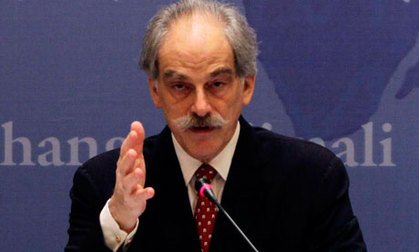 The International Monetary Fund (IMF) has expressed its growing concern about the deepening crisis in Greece, stressing that a failure by the European Union to take decisive action could lead to a domino effect through the single-currency zone and result in a second global financial meltdown. In its starkest warning yet that Greece has the potential to replicate the system-wide shock triggered by the collapse of Lehman Brothers in September 2008, the IMF told Europe's policymakers to stop squabbling over the terms of a bailout and act immediately to prevent contagion. "While courageous attempts have been made to address the crisis, policymakers are yet again facing uncomfortable dilemmas, raising uncertainty about the final outcome," the fund said in its annual health check on the eurozone. "With deeply intertwined fiscal and financial problems, failure to undertake decisive action could rapidly spread the tensions to the core of the euro area and result in large global spillovers." The warning from the IMF was issued by acting managing director John Lipsky, who has been in charge since the resignation of Dominique Strauss-Kahn last month. It came as Europe's finance ministers said the price of a fresh €12bn (£10.5bn) bridging loan to Greece was agreement by the parliament in Athens to fresh austerity measures. George Papandreou, the Greek prime minister, is currently trying to secure agreement for a package of measures that would involve deep wage cuts and sweeping privatisation. A team of officials from the IMF has been studying the eurozone economy and concluded that continued financial support for Greece from the other 16 members of the single currency was needed. It said a "more cohesive and co-operative approach is needed to manage the crisis in the periphery" – the group of nations including Greece, Ireland and Portugal that have needed financial help from the IMF and the EU over the past year. The IMF fears that without decisive action there is a risk of the crisis spreading to other heavily indebted eurozone countries such as Spain and Italy. Despite strong opposition to the austerity measures imposed as a condition of bailout funds, the IMF said it was vital that Greece and the other struggling nations embrace deep structural reform. "Crucial is a determined commitment to adjustment in the programme countries, including immediate and far-reaching structural reforms and an ambitious drive to open up the economy to foreign competition and foreign ownership along programme commitments. Privatisation will contribute to these objectives beyond helping to establish debt sustainability." The fund added: "Rapid implementation of the commitment to scale up the European financial stability facility and a further extension of its potential uses would sent a much needed signal that member countries 'will do whatever it takes to safeguard the stability of the euro area'. In this context, it will be essential to bring the unproductive debate about debt reprofiling or restructuring to closure quickly, and avoid and impression that the European stability mechanism will be conditional on debt restructuring." In its report, the IMF said the sovereign debt crisis threatened the "broadly sound" recovery in the euro area, adding that "much remains to be done to secure a dynamic and resilient monetary union". The IMF also said: "A strong core is pulling ahead of a periphery facing daunting challenges, with very high debt levels, severe competitiveness problems, and fragile banking systems. Strong policy action by national authorities is a prerequisite, but should be backed by a truly cohesive approach from all euro area stakeholders."
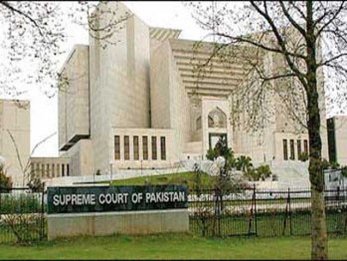 The federal government has written a letter to Chief Justice of Pakistan asking him to nominate a Supreme Court judge to head the probe body to investigate US raid which killed al Qaida chief, report said. The letter, which has been handed over to the Supreme Court Registrar by the law secretary on Sunday, requests the Chief Justice to appoint a judge of its own choice. The government had earlier constituted a five members commission headed by SC Judge Justice Javed Iqbal in the light of the joint resolution passed in the incamera session of the parliament to probe the Abbottabad incident.
WASHINGTON: The surest way to reduce world hunger is to help poor nations grow more food, US Agriculture Secretary Tom Vilsack said on Friday before a global meeting that will discuss food reserves and how to calm volatile markets.  In a commentary released by the Agriculture Department, Vilsack said an emergency stockpile would not be needed if information about crop production and supplies was shared more widely. Agreement for better monitoring of crop information is one of the goals by host nation France for next week’s meeting of agriculture ministers from the Group of 20 wealthy nations.
Decades of food aid have not erased widespread hunger, Vilsack said, so a better approach was to help food-short nations boost their farm and ranch production.
“I believe that the solution to global food security lies in innovation, arising from research and development,” Vilsack said in the commentary. “As we have done here at home, we should help other nations of the world embrace science in their pursuit of greater productivity.”
Some 925 million people, many of them subsistence farmers, are chronically hungry. Food production will have to rise by 70 per cent by mid-century, experts say, with the population expected to climb by one-third.
Earlier this week, Vilsack called for adoption of “the latest seed technology,” up-to-date land, water and animal management and appropriate use of fertilizers and pesticides.
US farmers rely heavily on genetically modified seeds. Europe is wary of the GM crops.
French President Nicolas Sarkozy has made stronger regulation of commodities markets, especially agricultural ones, a priority for G20 action. He has suggested that cash deposits should be required on all derivatives transactions and for regulators to have power to limit market share by investors.
Vilsack has not mentioned commodities regulation in his discussion of the G20 focus. U.S. futures regulators are midway through implementation of a financial reform law.
Before joining the G20 session, Vilsack plans to go to the Paris Air Show to talk about the U.S. development of biofuels for aircraft. He has said biofuels can promote food and energy security by generating income in rural areas. Skeptics blame biofuels for driving up food prices.
ISLAMABAD: Pakistan’s military chief is working to repair his army’s wounded pride in the bitter aftermath of the raid that killed Osama bin Laden, a humiliation that has strained US-Pakistani relations and raised questions about the top general’s own standing. 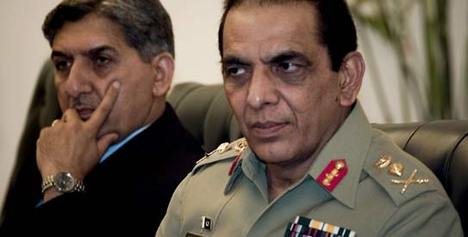 Retired and serving officers interviewed by The Associated Press spoke of seething anger within army ranks over the secret strike the Americans carried out on May 2, undetected by Pakistan’s military.
The US helicopter-borne operation set off a nationalist backlash: The usually untouchable army was sharply criticized in the press and on television talk shows, people demonstrated here in the capital demanding accountability, and open calls were made for the resignation of Gen. Asfaq Parvez Kayani, the military chief.
The army is Pakistan’s strongest institution, and Kayani the nation’s most powerful leader, but he ”has to be very careful,” said retired Lt. Gen. Talat Masood.
Like others interviewed, he doubted Kayani’s underlings would try to unseat him in an intra-army coup, but he noted occasions in the past when disgruntled officers were found to be plotting against their chief.
These rumblings generally occurred after the army suffered an embarrassing defeat, most notably Pakistan’s 1971 loss of East Pakistan, now Bangladesh, when India took 90,000 Pakistani prisoners of war who weren’t released for a year.
Last month’s raid on the al-Qaida leader’s Abbottabad compound resurrected public comparisons to that Bangladesh debacle.
In one sign of dented military prestige, Pakistan’s Supreme Court ordered the withdrawal of a two-star general after his men were caught on video killing an unarmed youth. The court took the unusual action ”in light of the hostile environment in the society toward the military,” said defense analyst Hasan Askar Rizvi.
The public disquiet weighs heavily on the officer corps and down through lower ranks, Masood said.
”It could all result in loose talk,” he said, but he thought it wouldn’t go beyond that. He noted that within days of the bin Laden raid, Kayani met with key corps commanders in an effort to assure his ranking officers they had not been humiliated.
There’s ”quite a lot of anger” within the military, retired Gen. Jehangir Karamat, a former chief of staff himself, said in a telephone interview from the eastern city of Lahore.
”Maybe there is talk,” he told the AP. ”Maybe anti-US feeling has gone up in the army. But actually there is in the country a whole lot of anger over the way it happened and the humiliation suffered, and it is inevitably reflected in the army.”
But, he added, ”all this talk of him fighting for his job, his survival, I don’t see any signs of that.”
Kayani is consistently described as a ”professional soldier” by his own men and knowledgable foreigners. But the general, who as a younger officer did some training in the US, may face criticism because of the Pakistani army’s close past cooperation with the US military and dependence on US aid.
At the same time, the Pakistanis have come under sharp criticism in Washington for having apparently missed bin Laden’s presence in Abbottabad.
Knowledgable observers here said the fracture with Washington could set back military-to-military relations between the two countries by years, as the Americans seek to step up the joint fight against al-Qaida and other militant groups in the Afghan border area.
”There is a very strong resentment, a very strong sense of betrayal of being discredited in the eyes of our own public. What our enemies have not been able to do they (the US) have done to us,” said a senior military official, who asked that his name not be used to speak candidly.
Pakistan has already sent home nearly 100 US military personnel, most of whom were training the Frontier Corps, the tribal force that patrols Pakistan’s long and porous border with Afghanistan.
Pakistan is holding up visas for CIA officials waiting to come here, and Pakistan’s intelligence agency has arrested alleged CIA informants said to have helped lead the Americans to bin Laden.
In Washington last week, Adm. Mike Mullen, the Joint Chiefs of State chairman who has been to Pakistan to try to patch up differences, said letting the relationship with this nuclear-armed nation deteriorate isn’t an option.
If the relationship crumbles or ”were we to walk away, I think it’s a matter of time before the region is that much more dangerous and there would be a huge pull for us to have to return to protect our national interests,” Mullen added.
First lady Michelle Obama’s upcoming five-day goodwill tour to sub-Saharan Africa, designed to highlight HIV/AIDS projects and inspire young adults there, is billed by the White House as an important next step in the administration’s outreach to the continent.
But the trip also has resurrected criticism among a vocal subset of Africa advocates — including President Obama supporters — who say they are disappointed that the first American president with African roots has not personally focused more on the region.
KABUL: The United States and other foreign powers are engaged in preliminary talks with the Taliban about a possible settlement to the near decade-long war in Afghanistan, Afghan President Hamid Karzai said on Saturday, the first official confirmation of US involvement in negotiations. 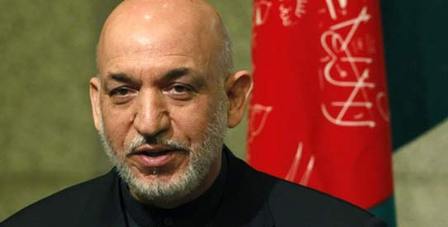 Diplomats have already said there have been months of preliminary talks between the two sides, and Karzai, who is a strong advocate of peace talks, has long said Afghans are in contact with insurgent groups.
“Peace talks are going on with the Taliban. The foreign military and especially the United States itself is going ahead with these negotiations,” Karzai told a news conference in the Afghan capital.
The US Embassy in Kabul declined immediate comment.
Karzai was speaking the day after the UN Security Council split the UN sanctions list for Taliban and al Qaeda figures into two, which envoys said could help induce the Taliban into talks on a peace deal in Afghanistan.
Despite hopes that talks with the Taliban could provide the political underpinning for the US staged withdrawal from Afghanistan, the discussions are still not at the stage where they can be a deciding factor.
US Defence Secretary Robert Gates said earlier this month there could be political talks with the Taliban by the end of this year, if the Nato alliance kept making military advances on the ground, putting pressure on the insurgents.
There are also many Afghans, among them women’s and civil society activists, who fear talks with the insurgents could undo much of the progress they have made since the 2001 ouster of the Taliban government.
The United States is on the verge of announcing a “substantial” drawdown of American troops from Afghanistan, Senate Majority Leader Harry Reid said on Friday.
“There’s going to be a drawdown. I am confident that it will be one that’s substantial. I certainly hope so,” the leading Senate Democrat said during an interview with PBS Newshour.
There currently are about 100,000 US troops fighting in Afghanistan, up from about 34,000 when President Barack Obama took office in 2009.
|










 RSS Feed
RSS Feed